




County Down is a beautiful region in Northern Ireland that offers a wide range of activities for families.
From exploring historic castles to hiking in the Mourne Mountains, there is something for everyone to enjoy. Here are a few ideas for fun family activities to do in County Down:
Mourne Mountains: The Mourne Mountains are a stunning mountain range that offers a variety of hiking trails for all levels of experience. Families can enjoy a leisurely stroll along the lower slopes or challenge themselves with a more strenuous hike to the summit of Slieve Donard, the highest peak in Northern Ireland.
Castlewellan Forest Park: This beautiful park offers a variety of activities for families, including walking and cycling trails, a lake for boating, and a play park for children. The park also has a visitor
centre where you can learn about the local flora and fauna.
Tollymore Forest Park: Another great option for families is Tollymore Forest Park, which is known for its beautiful scenery and its role as a filming location for the popular TV series “Game of Thrones”. The park offers a variety of walking trails, a river walk, and a picnic area.
Strangford Lough:
This large sea lough is a great place for families to enjoy a variety of water activities, such as kayaking, canoeing, and paddle-boarding. Families can also take a boat tour of the lough to see the seals and other wildlife that live there.
Exploris Aquarium: This popular aquarium is home to a variety of marine life, including sharks, rays, and seals.

Families can learn about the different species that live in the Irish Sea and participate in interactive exhibits.
Down County Museum: This museum tells the story of County
Down from prehistoric times to the present day. Families can learn about the history of the region and see artifacts from different periods.
Saint Patrick Centre: This centre
tells the story of Saint Patrick, the patron saint of Ireland. Families can learn about his life and his impact on Irish culture.
No matter what your family enjoys, you are sure to find plenty
of fun activities to do in County Down. With its beautiful scenery, rich history, and variety of attractions, County Down is the perfect place to create lasting memories with your loved ones.
As Winter starts to give way to Spring, we can look forward to warmer temperatures, more sunshine and longer nights.

But you will also soon lose out on an hour of sleep as the clocks go forward to mark the beginning of British Summer Time (BST).
This year, the clocks go forward on Sunday, March 30 at 1am.
This means you will lose an hour’s sleep, although it will stay lighter for longer as we move throughout Spring and into Summer.
Any device in your home connected to
the internet, such as smartphones, laptops, tablets and TVs will automatically change. However, alarm clocks, car radios and other devices may need to be changed manually. A helpful phrase to remember is “spring forward, fall back” to know whether the clocks are going forward or back. The clocks will go back again by an hour at 2am on Sunday, October 26.

Family, friends and ex-colleagues of the late Joe Breen OBE, met at Belfast Marina in Abercorn Basin for the renaming of the Department’s new survey vessel to the ‘Joe Breen’.
Minister Muir is pictured with members of the Breen family at the renaming ceremony. Pictured (L-R) are Joe Breen (Jr), Louisa Breen, Minister Andrew Muir, Anne (Huggy) Breen, Sarah Wynne (nee Breen) and Mark Wynne.
The renaming ceremony was hosted by Minister Muir along with members of the Breen family including his widow Huggy and children
Sarah and Joe (Jr). Joe was a much-loved and highly respected member of the DAERA Marine and Fisheries team with a career spanning over 30 years in the Civil Service, primarily in the field of marine conservation and environmental protection. He died in June 2024 after a short illness.
Having heard of Joe’s work from both officials and stakeholders, particularly the Rathlin Islanders, Minister Muir made the decision that the new DAERA boat would be named after Joe.

Minister Muir stated: “It is most fitting that this new and innovative survey vessel is named after Joe, who spear-headed innovation in marine survey for so many years. Joe also pioneered the work on the first Marine Conservation Zones around Northern Ireland, “He had that special gift of bringing complex science to life with other scientists and the public alike through pictures, radio and television. I am so pleased that Joe’s efforts both within the Department and in his expansive volunteering with Community Rescue, RNLI, the Naval Reserve and in other areas were recognised in October 2023 in his being awarded an OBE.
“Joe was an exceptional officer and leaves a strong legacy of innovation in the many scientists that he worked with in the Department. It is so appropriate that this beautiful survey catamaran is also now part of that
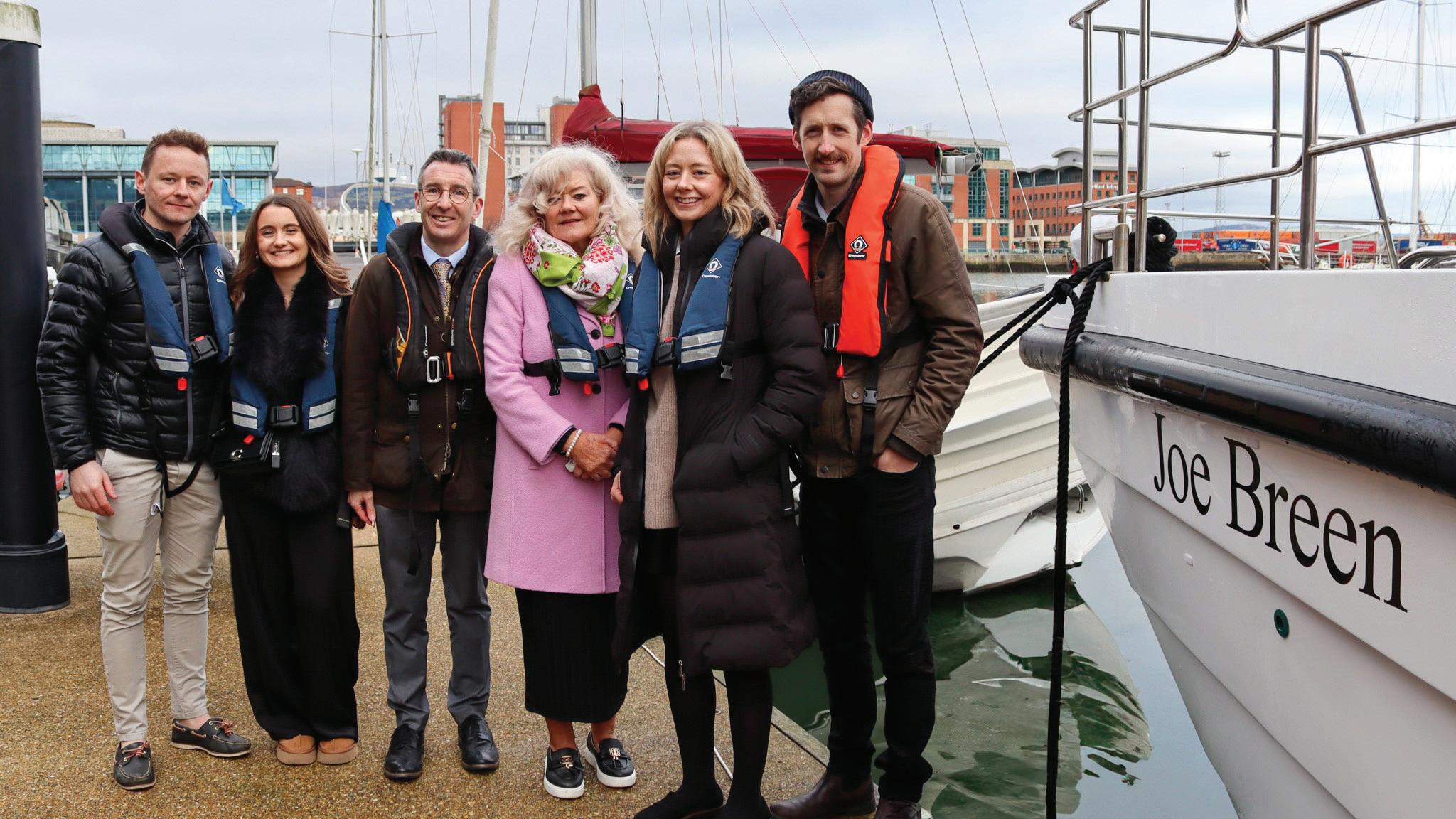
legacy.”
Joe’s wife Huggy said:
“We are deeply honoured that Joe’s legacy will live on through this survey vessel. His guiding principle was never to seek financial gain, but to be remembered for his good initiatives and unwavering commitment to helping others. On behalf of our entire family circle, I
wish to express our heartfelt gratitude for this great honour of renaming the Department’s new survey vessel the SV Joe Breen.
“Joe had a deep love and passion for the sea and was an unwavering champion for nature. His legacy in marine conservation science will hopefully shape the future for the next generation,
ensuring that the complex balance between marine resource exploitation and sustainability is maintained. It is especially meaningful that his memory will continue on the sea, where he spent his happiest times and we are delighted that his name will live on, on the high seas.”
Minister Muir spent some
time with the family aboard the Survey Vessel Joe Breen, emerging then to complete the naming ceremony with Breen family members. The event was watched from the shore by a wider collection of family, friends and ex-colleagues, all of whom then had the opportunity to tour the SV Joe Breen.

DAERA has today launched the Rural Business Development Grant Scheme which will deliver £1.55million in capital grants to support rural micro businesses across Northern Ireland.
The Rural Business Development Grant Scheme is funded through the Department of Agriculture, Environment and Rural Affairs
‘Tackling Rural Poverty and Social Isolation’ (TRPSI) Programme and is delivered in partnership with local Councils.
Eligible rural businesses can apply for capital assistance of 50% up to the value of £4,999 for the purchase of capital equipment which will help their business to enhance sustainability or
lead to growth opportunities and the creation of employment opportunities which in turn strengthen the rural economy.
Launching the scheme, Minister of Agriculture, Environment and Rural Affairs, Andrew Muir, MLA, said: “I am pleased to announce the opening of the £1.55million Rural Business Development Grant Scheme.
This fund is important in delivering on the Department’s priority of building strong sustainable and

diverse rural communities and the draft Programme for Government priority of growing a globally competitive and sustainable economy with a focus on addressing regional balance.”
Minister Muir continued: “I urge all eligible rural businesses to go online and apply as soon as possible. Rural Businesses continue to play a vital role in our rural communities, and I want to support them at this challenging time and
provide them with opportunities that will maximise their potential and stimulate business growth.”
Details of the Rural Business Development Grant Scheme are on the DAERA website at: https://www. daera-ni.gov.uk/services/ rural-business-developmentgrant-scheme-rbdgs. Only online applications can be accepted for this scheme.
The Scheme opens for applications at 9:00am on 16 October 2024 and closes at 12 noon on 8 November 2024.

Mission:FarmStrong is back again this year and will be bigger and better than before at new livestock mart locations across Northern Ireland.
These awareness events are for all members of the farming community to encourage them to carefully consider their physical, mental and spiritual wellbeing. The campaign is supported by the Rural Chaplaincy, Farm Families Health Checks, Health & Safety Executive NI, Rural Support, Ulster Farmers’ Union and the Northern Ireland Agri-Rural Health Forum; and this year the organisations have decided to hold this event in aid of Action Cancer, a local charity close to their hearts.
Rev Kenny Hanna, a member of the Rural Chaplaincy team and the instigator behind this awareness campaign said, “We are delighted to launch Mission:FarmStrong 2025 and this year it shall be in aid of
Action Cancer. It is great to have so many different organisations from across the province coming together in support of the farmers and farm families’ business and personal well-being on their home soil.
As an added bonus, the Rural Chaplaincy will be travelling to all 6 marts in a New Holland tractor, kindly sponsored by Burkes of Cornnascriebe and we will be meeting with eight local primary schools along the way to help promote our message of a positive health and wellbeing for all. We look forward to seeing you all at your local mart!”
Dates and locations of participating marts for the ‘Mission: Farm Strong’ events from 10.30am until close are:
• Monday 17th February at Swatragh Mart
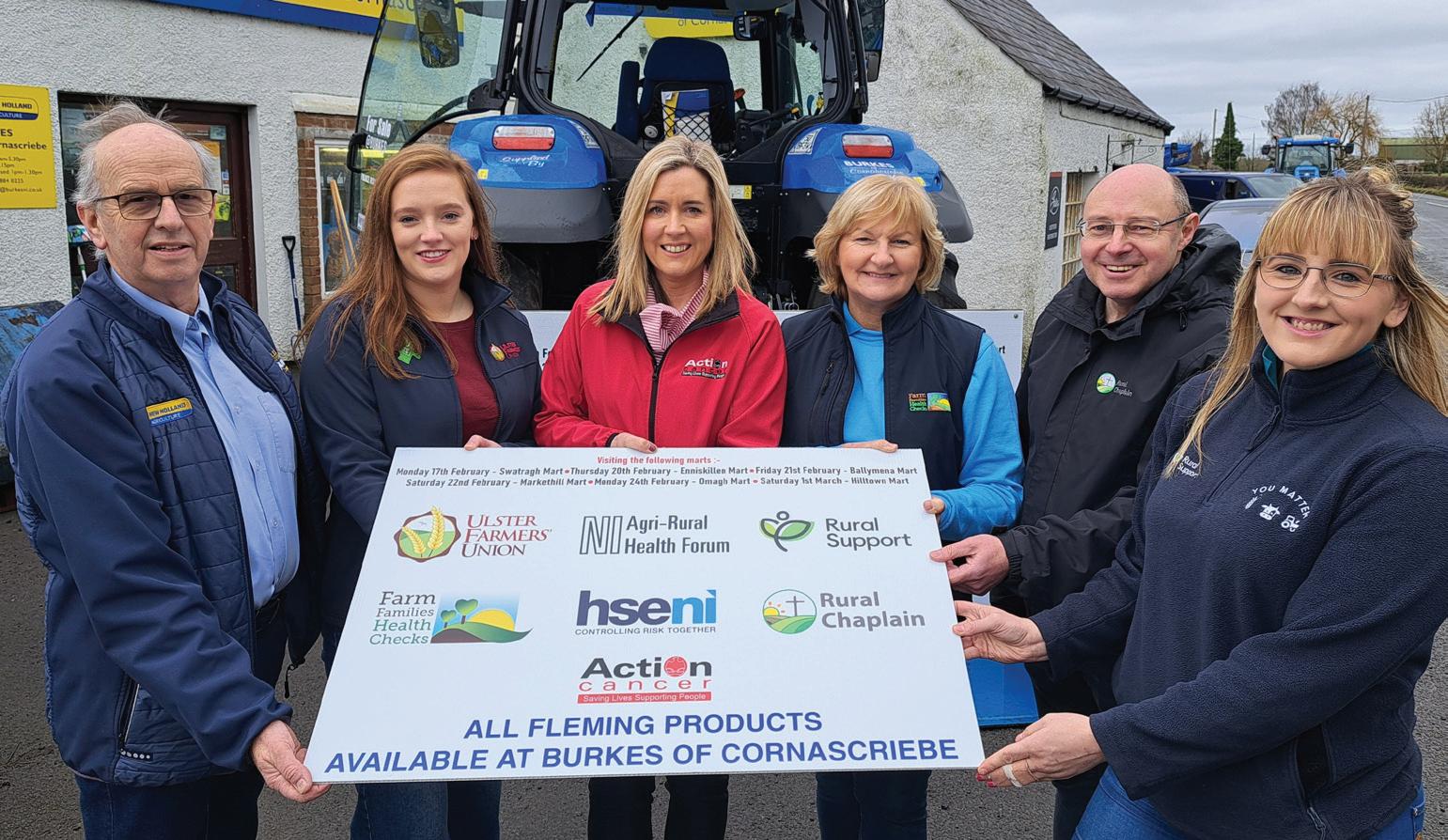
• Thursday 20th
February at Enniskillen Mart
• Friday 21st February at Ballymena Mart
• Saturday 22nd
February at Markethill Mart
• Monday 24th
February at Omagh
Mart • Saturday 1st March at Hilltown Mart
At the marts, farmers and farm families will have the opportunity to meet with representatives from Ulster Farmers’ Union, Health &
Safety Executive NI, Rural Support and the Northern Ireland Agri-Rural Health Forum. Individuals will also be able to avail of free health checks at all 6 marts which will be provided by the Farm Families
Health Check Van and Action Cancer’s ‘Big Bus’ will be providing breast screening and health check clinics at the Enniskillen mart on Thursday 20th Feb and Markethill Mart on Saturday 1st March. To book an appointment
for the ‘Big Bus’, please visit www.actioncancer. org/appointments.
Gareth Kirk, CEO, Action Cancer commented on this campaign, “Action Cancer is absolutely delighted to have been chosen as the beneficiary of this year’s Mission; Farm Strong Campaign and to support the Rural Chaplaincy team in their invaluable work amongst farmers and the rural community. With so many local farmers and their families being impacted by a cancer diagnosis, Mission Farm Strong provides us with a great platform to spread awareness of our free life-saving, early detection and support services. We know how generous the agricultural and rural community in Northern Ireland are and hope that we will raise much-needed funds,
allowing us to continue to provide these vital services all across Northern Ireland.”
If you would like more information in support of your health and well-being, please visit the NI Farm Support hub at www. ruralsupport.org.uk or telephone Rural Supports freephone confidential Support Line 0800 138 1678 available Monday –Friday 9am-9pm. You can also speak with one of the nurses at the Farm Families Health Checks van or the Action Cancer Big Bus at your local participating mart if you have any health concerns.
If you would like to make a contribution in support of this campaign, please donate via the Just Giving page https://www.justgiving. com/campaign/ missionfarm

In the heart of rural Ireland, a farmer named Phil Stewart is cultivating more than just crops. His heart-warming videos showcasing farm life have captured the hearts of millions online, transforming him into a social media sensation.
Phil’s journey to internet fame began innocently enough. He started sharing glimpses of his daily life on the farm, from tending to his animals to harvesting crops.
His videos, filled with genuine humour and a love for the land, resonated with viewers seeking a connection to nature and a simpler way of life.
Along with his father, known as Father Phil, and his long suffering partner Liv Phil has embraced the platform, using it to educate viewers about farming practices, buildings

maintenance, the renovation of a house on the farm and the importance of supporting local agriculture. He also shared personal stories and insights into the challenges and joys of running a farm, offering a rare glimpse into a world often hidden from public view.
Phil’s authenticity, honesty and downto-earth demeanor have endeared him
to fans around the globe. His regular (3 times weekly) videos are a testament to the power of social media to connect people and share stories that inspire and entertain. As he continues to cultivate his online presence, Farmer Phil is proving that there’s more to farming than meets the eye.
Farmer Phil has over 54,000 subscribers on his YouTube channel.

Blue-green algae, also known as cyanobacteria, are a type of bacteria naturally found in freshwater environments.
While some species are harmless, others can produce toxins that pose significant risks to human and animal health. Contact with water containing high levels of blue-green algae can cause skin irritation, rashes, and eye irritation. Ingesting

contaminated water can lead to gastrointestinal illness, including nausea, vomiting, diarrhoea, and abdominal cramps. In severe cases, exposure to certain blue-green algae toxins can affect the nervous system, causing headaches, dizziness, weakness, and even liver damage. Dogs are particularly susceptible to the effects of bluegreen algae. Drinking contaminated water or even licking algae off their fur can have serious, and potentially fatal, consequences. Blue-green algae blooms often appear as thick, green, or blue-green mats or scums on the water surface. They can also make the water look like paint or pea soup. The water may appear discoloured, with unusual colours such as green, bluegreen, brown, or even red. The water may also have a musty, earthy, or even grassy odour.
If you suspect the

presence of a blue-green algae bloom, avoid swimming, wading, or allowing pets to enter the water. Do not drink from any water source that may contain a blue-green algae bloom. Prevent pets from drinking the water, swimming in it, or licking algae off their fur. If you observe a blue-green algae

bloom, report it to your local health department or environmental agency. Not all blue-green algae blooms are toxic. The level of risk varies depending on the type of algae present and the concentration of toxins. It can be difficult to visually distinguish between harmless and toxic algae blooms.
This article provides general information and should not be considered medical advice. If you suspect exposure to bluegreen algae, consult with a healthcare professional or veterinarian. It’s crucial to be cautious around any body of water that appears discoloured or has unusual odours.

The winter months can often feel long and dreary. But with the right escape, at just the right time, you can transform the season with a cosy and rejuvenating experience. A relaxing hotel break can be the perfect antidote to the winter blues, offering a chance to unwind, recharge, and enjoy some muchneeded pampering.
When choosing your winter wonderland, consider the ambiance.
A crackling fireplace is the epitome of winter cosiness.
Look for hotels with inviting fireplaces in guest rooms, lobbies, or communal areas.
Opt for hotels with warm and inviting interiors, featuring rich colours, plush textiles, and comfortable furnishings. While winter days may be short, ensure your chosen hotel maximizes natural light. Large windows and skylights can make a big difference. Indulge in the hotel’s wellness facilities.
Enjoy luxurious spa treatments like massages, facials, and body wraps. Escape the cold with a relaxing swim in an indoor pool, perhaps with a jacuzzi or sauna for added relaxation. Maintain your fitness routine with a well-equipped
gym or take advantage of fitness classes like yoga or Pilates.
Savour delicious meals at the hotel’s restaurant, perhaps enjoying a romantic dinner by candlelight. Look for cosy dining areas with warm lighting and inviting atmospheres. Treat yourself to a traditional afternoon tea, complete with delicate sandwiches, pastries, and a pot of steaming hot tea.
If you’re looking for more than just relaxation, choose a hotel near winter sports destinations that appeal, in Northern Ireland we are fortunate enough to have a wealth of opportunities for activities such as mountain or hill hiking, horseriding, cycling, surfing, boating, shopping and simply walking. Explore the surrounding area with

a scenic winter walk, enjoying the crisp air and picturesque landscapes. Alternatively, enjoy a cosy night in with a good book, a glass of wine, and a roaring fire.
Look for hotels that offer personalized
service, going the extra mile to ensure your stay is truly unforgettable. Many hotels offer special winter packages, including discounts, complimentary upgrades, and festive treats. If you’re planning a romantic
getaway, look for hotels with intimate settings, such as boutique hotels or charming country inns. By considering these factors, you can find the perfect hotel break to escape the winter blues and create lasting memories.


A key part of the Soil Nutrient Health Scheme (SNHS) is the completion of training to utilise the information provided in soil analysis reports.
Training has been developed by the College of Agriculture, Food and Rural Enterprise (CAFRE).
ac.uk/snhs-training
For those who do not have access to online training or do not feel
This training helps farmers to understand and interpret their SNHS soil analysis report, make best use of organic manures, and learn how to create a Nutrient Management Plan. It can be completed from the comfort of their home online at: www.cafre.
confident in its use, a limited number of faceto-face training sessions are being provided.
These will involve viewing the training videos in a theatre.
This training is being delivered by Countryside Services Ltd.

Commenting on the delivery of the faceto-face Soil Nutrient Health Scheme training, Dr Andrew Kerr, Rural Services Contract Manager at Countryside Services Ltd stated: “Following the success of the events held to date we have experienced a surge in interest from farmers wishing to attend the face-toface training courses. Farmers recognise that completing the training could be necessary to receive payments under future farm support schemes and have demonstrated an appetite to attend the face-toface training events. To cater for demand we are pleased to release a further four additional training dates.”
Enniskillen:
Wednesday 22 January from 1.00pm to 5.00pm in the Ardhowen Theatre
Craigavon: Thursday 30 January from 1.00pm to 5.00pm in the Civic Centre
Cookstown: Monday 10 February from 1.00pm to 5.00pm in the Burnavon Arts and Cultural Centre
Downpatrick: Wednesday 19 February from 1.00pm to 5.00pm in the St Patrick’s Centre
To book your place visit: www.cafre. ac.uk/snhs-training or telephone Countryside Services on 028 8778 9770.
Please note that preregistration for these events is essential, and you must bring photographic ID with you.
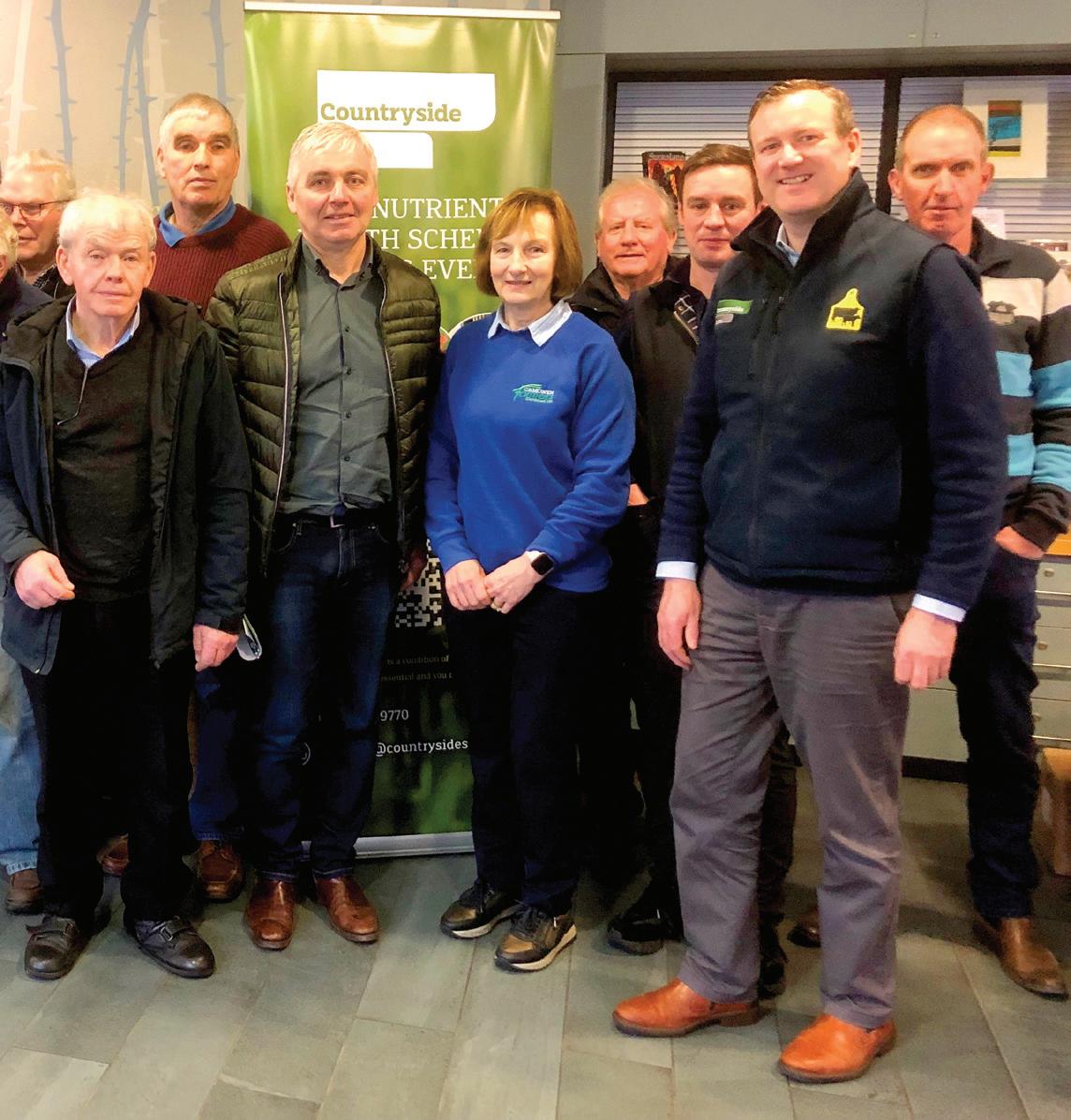
The UK farming landscape is undergoing a technological revolution, with cutting-edge machinery and vehicles poised to transform productivity and efficiency.
Self-driving tractors and harvesters, equipped with GPS, sensors, and AI, are now capable of operating independently, reducing the need for human intervention. This allows farmers to focus on other tasks, improving efficiency and reducing labour costs.


Drones equipped with sensors capture detailed data on crop health, soil conditions, and irrigation needs. This information, combined with variablerate technology, enables farmers to apply inputs like fertilizer and pesticides precisely where needed, optimizing resource use and minimizing environmental impact.

Telematics systems allow farmers to monitor their machinery remotely, track performance, and diagnose problems in realtime. This reduces downtime and improves maintenance efficiency. Furthermore, data collected from sensors and machinery can be analyzed to identify trends, optimize operations, and improve decision-making.
Electric and hybrid vehicles offer sustainable alternatives to traditional dieselpowered models, reducing emissions and operating costs.
Robotics and automation are also playing a significant role. Robots can be used to identify and remove weeds, reducing the need for herbicides and improving crop quality. Automated milking systems can collect milk from cows more efficiently and hygienically, improving milk quality and reducing labour costs. These technologies are not only improving efficiency and productivity but also helping farmers to reduce their environmental impact and adapt to the challenges of climate change.
As technology continues to evolve, UK farmers are well-positioned to embrace innovation and remain competitive in the global marketplace.


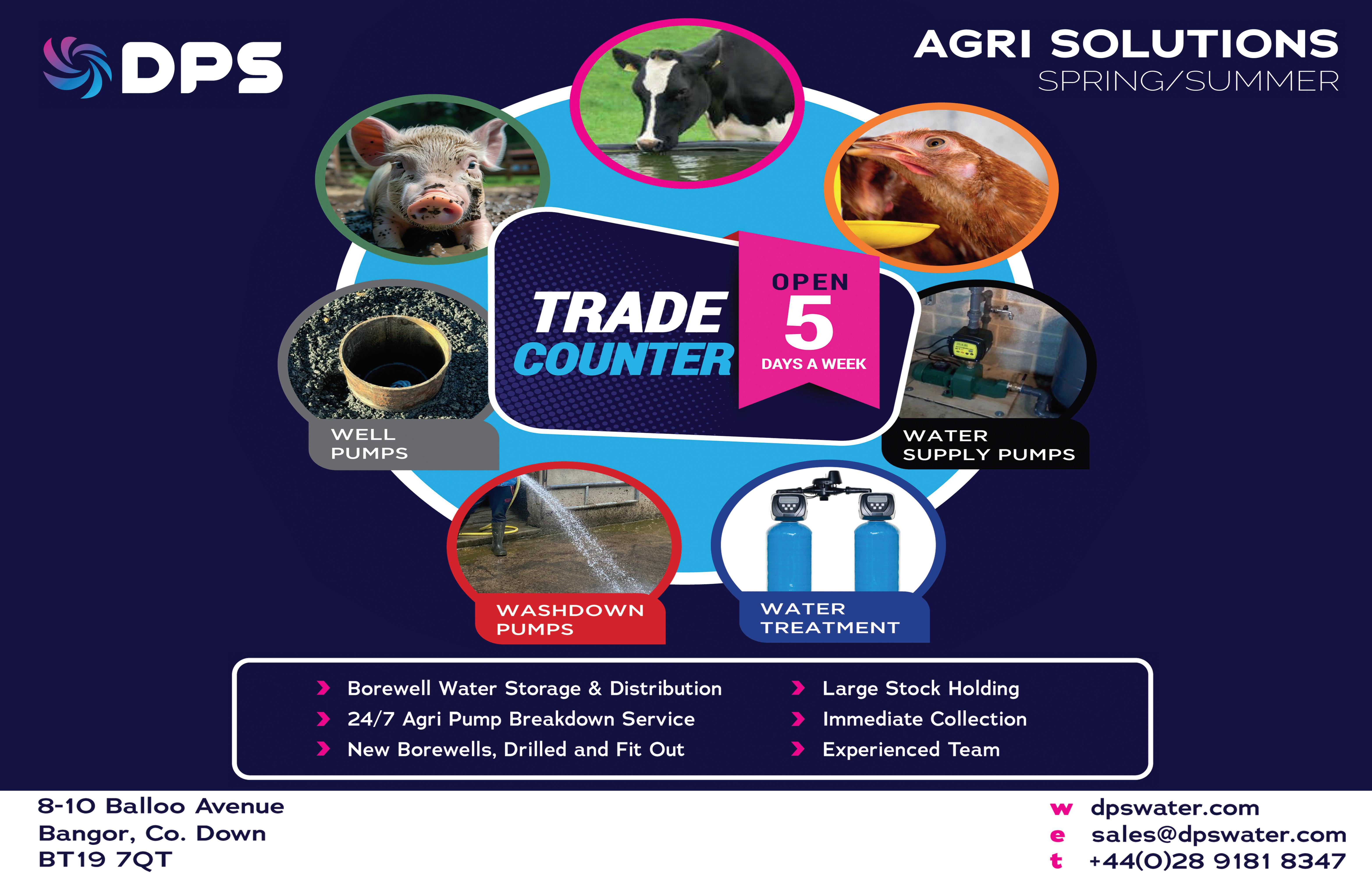


A range of policies aimed at strengthening animal welfare, such as introducing Lucy’s Law to ban third party sale of puppies and kittens, outlawing the use of adverse training devices such as shock collars and mandating microchipping of cats are among the top priorities for proposed animal welfare reforms in Northern Ireland, Andrew Muir MLA has said.
During a number of engagements last week, the Agriculture, Environment and Rural Affairs Minister updated stakeholders on proposals for his key animal welfare priorities.
Minister Muir met with members of the Northern Ireland Companion Animal Welfare Group (NICAWG) and the All-Party Group on Animal Welfare.
The Minister updated stakeholders on current work to bring forward a version of Lucy’s Law for Northern Ireland and consulting on mandatory CCTV in slaughterhouses. Additionally, he informed the group of his intention to convene an expert group to review Dog Breeding regulations.
Minister Muir said: “Animal welfare is one of my top priorities and I want to ensure that we focus on the right initiatives and that our resources are focused in the areas most in need of reform.
“I intend to bring
forward a suite of secondary legislation to address a wide range of issues including the mandatory microchipping of cats and strengthening microchipping requirements, including making it an offence not to update records, and the prohibition of the use of aversive training devices such as shock collars.
“While my department is currently advancing preparations to bring forward a version of Lucy’s Law for Northern Ireland, and consult on mandatory CCTV in slaughterhouses, I was pleased to discuss with stakeholders other anticipated reforms. These include my ambition to commission a comprehensive expert review of dog breeding licensing, which would also consider the need for regulation of canine fertility services.”
The Minister continued:
“I want an open and ongoing dialogue on these

matters. While I want to give an indication of what the priorities will be, the detail of those reforms will be open to public consultation and ongoing dialogue with key stakeholders. I believe
that by working together we can ensure efforts are focused on addressing the right issues and collectively, we can go further to achieve the best possible outcomes.”
The Minister concluded:
“Once you are sure you can commit to the responsibility of owning a pet, please consider adopting and providing a home to the many animals living in rehoming organisations.”
An Avian Influenza Prevention Zone (AIPZ) was introduced in Northern Ireland recently..
The decision to introduce the AIPZ in Northern Ireland came following confirmation of Highly Pathogenic Avian Influenza (HPAI) H5N1 in a sample collected from a wild goose found near Black Lough, Dungannon, County Tyrone. This was the first wild bird positive in Northern Ireland since September 2023. Two further wild birds tested positive for HPAI H5N1 in mid January. One was a buzzard found near Moira and the other a whooper swan in Portballintrae.
The AIPZ places a legal requirement on all bird keepers in Northern Ireland to follow strict biosecurity measures.
This applies if you keep pet birds, commercial flocks or just a few birds in a backyard or hobby flock.
Announcing the introduction of the AIPZ, Minister Muir said: “With the detection of the first cases of notifiable avian influenza in Northern Ireland since September 2023, all flock keepers should take immediate action on biosecurity and good farm practice to reduce the risk of incursion of avian influenza into the Northern Ireland poultry flock.
“Due to the first positive detections of HPAI in wild birds in NI since September 2023, I have decided
to implement an Avian Influenza Prevention Zone across Northern Ireland from 12:00 (noon) on Saturday 18 January 2025.”
“Northern Ireland relies heavily on the agri-food industry as a source of employment.
Poultry and egg production contributes significantly to the economy, and is valued at over £600 million, it is vital that we protect this industry.”
Chief Veterinary Officer for Northern Ireland, Mr Brian Dooher, added: “The measures in the Avian Influenza Prevention Zone include stringent, mandatory biosecurity measures to help prevent the spread
of the disease from wild birds or another source to poultry; a requirement that poultry or other captive birds are provided with food and water to which wild birds have no access, and mandatory rules on cleansing and disinfection.
“There is currently no requirement for poultry to be housed and bird gatherings are not prohibited at this stage, but this will be kept under constant review.
“I would encourage all flock keepers, even if you keep just one bird, to improve biosecurity in order to prevent an incursion of the disease into our poultry flock.
If Avian Influenza were to enter our Northern
Ireland flock, it would have a significant and devastating impact on our poultry industry, international trade and the wider economy.”
If not already registered, DAERA encourages you to register your flock (however small) so that we can reach you directly with future communications and updates. You can register by contacting your local DAERA Direct office or online via the DAERA website at https:// www.daera-ni.gov. uk/publications/birdregistration-form. You can also sign up to the text alert service simply by texting ‘BIRDS OPT IN’ to 07860 098672.
Agriculture, Environment and Rural Affairs Minister Andrew Muir has reiterated his commitment to work in collaboration with the agriculture industry to create a sustainable sector for future generations.
Speaking at the Ulster Farmers Union and Young Farmers Clubs of Ulster conference, the Minister said that while farming is going through challenging times, work is ongoing to implement new support schemes and development programmes.
Minister Muir said:
“The overall objective is to transition to a more sustainable farming sector by implementing policies and strategies that benefit our climate and environment, whilst at the same time supporting our economically and socially significant agri-food sector.
“Crucially the policies under development are evidence-led with a firm focus on data to help with decision making. Science
and innovation are key drivers for these new policies, with skills and smarter ways of working critical to success, realizing the benefits of science and technology and enabling better succession planning.
“These initiatives will also deliver on securing sustainable productivity within Northern Ireland agriculture and help to support food security and high standards of disease control, public and animal health,” the Minister added.
Turning to the subject of Lough Neagh, Minister Muir commented: “The issues of improving water quality are tough, I don’t shy away from them because we owe it both to communities around Lough Neagh and farmers of
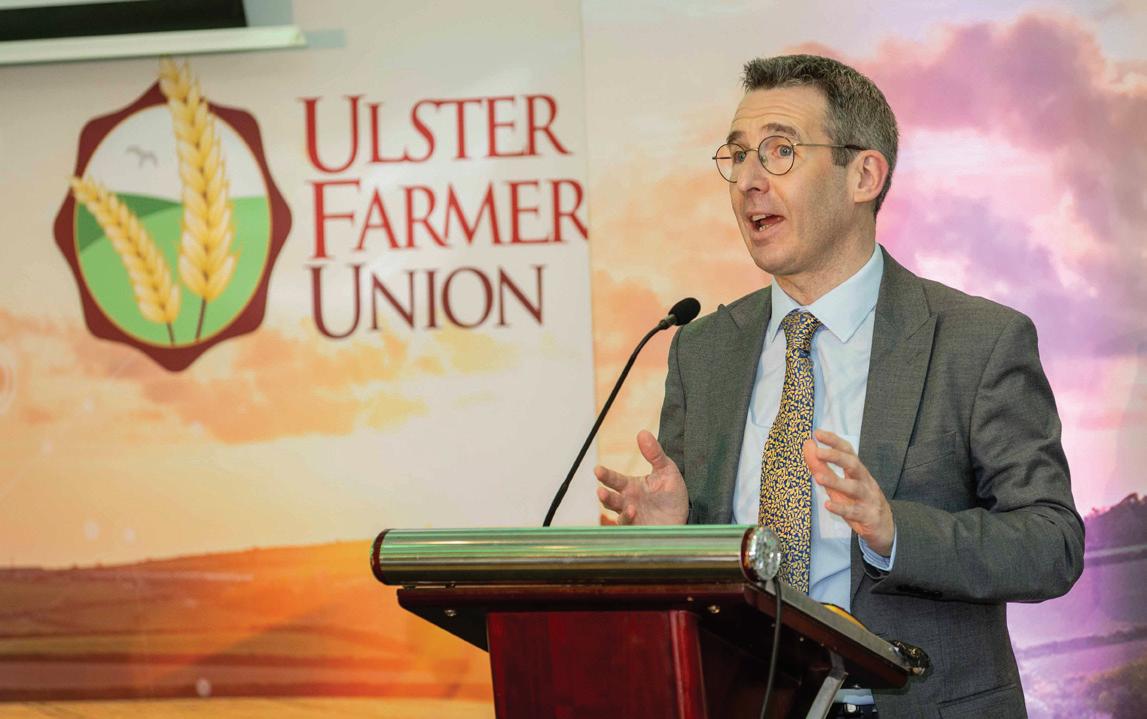
Country Living Chic is more than just a decorating style; it’s a feeling. It evokes a sense of warmth, comfort, and a connection to nature, even if you live miles from the nearest farm.
To infuse your home with this timeless aesthetic, embrace natural materials.
Incorporate wood, such as rustic beams, reclaimed wood furniture, and woven baskets. Add stone accents like a fireplace surround, flooring, or a stone-topped table.
Opt for natural fabrics like cotton, linen, and wool. Use them for cosy throws, textured rugs, and embroidered curtains.
Bring the outdoors in by filling your home with plants, from leafy ferns to flowering blooms.
Consider a small herb garden on your windowsill.
Incorporate natural elements like branches, dried flowers, and seashells into your decor. Maximize natural light by keeping windows uncovered and framing beautiful views with curtains or blinds.
Create a cosy atmosphere with a fireplace, if you have one. If not, consider a wood-burning stove or even an electric fireplace.
Layer lighting with table lamps, floor lamps, and soft-glowing candles to create a warm and inviting

ambiance. Mix and match textures to add depth and interest. Think of sheepskin rugs, chunky knit throws, and velvet cushions.
Incorporate vintage and antique finds.
Hunt for unique pieces at flea markets, antique shops, and estate sales. Add character with vintage
china, antique mirrors, and old maps. Incorporate treasured family heirlooms to add a personal touch. Keep it simple and uncluttered. Avoid overcrowding your space. Keep surfaces clean and uncluttered for a relaxed and airy feel. Invest in high-quality pieces that will last for
years to come. Embrace imperfections. A few scuffs and scratches can add character to your furniture. Add personal touches. Display cherished family photos throughout your home. Incorporate souvenirs from your travels to remind you of special memories. Create a cosy reading nook with
a comfortable armchair and a collection of your favourite books. Country Living Chic is all about creating a home that feels both welcoming and stylish. By incorporating these tips, you can transform your space into a haven that reflects your love of nature and all things cosy!


Your local British garden Centres will have all you need to make the most of your birdwatching experience, from bird feeders and seeds and the team have put together this guide to help you spot more avian visitors!
How to attract more birds to your garden
Want to increase your chances of spotting a variety of birds? British Garden Centres has everything you need to create a bird-friendly haven.
Bird-friendly plants: Our stores are brimming with birdattracting plants, and we recommend planting berries, seeds, and nectar-rich flowers which are a feast for birds all year round. Crab apples, berry bushes, and fruit trees provide food and shelter from predators and the unpredictable UK weather. Plants such as holly, hawthorn, and rowan offer delicious berries or attract insect snacks, meaning birds will come flocking to the garden for a tasty treat. Feeders for your outdoor space: At this time of year, when the weather is cold and food
is scarcer, birds’ diets will need supplementing, and we stock a wide range of feeders for seeds, suet, and nectar. Whatever the size of your garden, invest in seed feeders, perfect for small birds like tits and sparrows, and come in various styles from ones you can hang from a balcony or tree to stakes that have the full works for your lawn We also have mealworms and peanut feeders cater to multiple birds, while fat ball feeders provide essential energy, especially during winter.
Perfect homes: Provide safe havens with our selection of birdhouses and nest boxes. It’s important to choose the right size hole for different species: small for tits, larger for starlings. Open-fronted boxes are ideal for robins and song thrushes.
Garden birds need
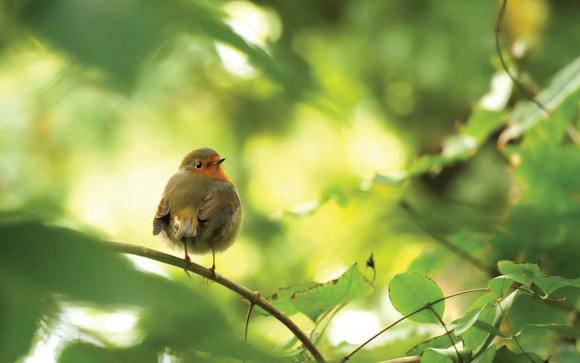
sheltered places to roost to conserve energy and stay warm and they can also be used for early nesting by some bird species like blue tits and great tits.
Bird baths and bowls: Birds need water yearround and the UK winter sometimes sees natural water sources like ponds and streams freezing, making it
difficult for birds to find fresh water for drinking and bathing. Choose from shallow dishes, bowls, or elevated birdbaths to help them remove dirt and aid digestion of food.
Amy Stubbs, Project & Development Manager at British Garden Centres said: Our knowledgeable and friendly staff can offer expert advice on
bird feeding, including choosing the right feeders and keeping them clean, as well as advice on bird-friendly gardening like avoiding harmful pesticides, providing clean water, and creating a diverse garden that birds will want to visit again and again.”
Website: www. britishgardencentres.com

Nestled in the heart of Lisburn, Northern Ireland, the Eikon Exhibition Centre is a beacon of innovation, adaptability, and excellence in the events industry.
Opened in 2015, this premier venue has redefined the standard for exhibitions, conferences, and large-scale gatherings in the region.
As the centre celebrates its 10th anniversary, it’s an opportunity to reflect on its remarkable journey and the visionary leaders who spearheaded the transition from its original home at Kings Hall, Belfast.
A New Beginning: From Kings Hall to Eikon
The relocation from the Kings Hall—home of the Royal Ulster Agricultural Society (RUAS) for over 80 years—to the purpose-built Eikon Exhibition Centre was a monumental undertaking, spearheaded by the Royal Ulster Agricultural Society with three key individuals at the forefront of this ambitious project: Theresa Morrissey, Group Executive Director; Rhonda Geary, Group Operations Director; and David Browne, Operations Manager. At the time, Colin McDonald, RUAS Chief Executive, played an instrumental role in overseeing the entire process, providing leadership and vision throughout the relocation.
Under Colin McDonald’s stewardship, the project was guided to success, ensuring that the move to the stateof-the-art Eikon Exhibition Centre would serve as a fitting home for the future of
the RUAS. His expertise and dedication were pivotal in navigating the complexities of the transition and positioning the society for continued growth and success in its new location.
Their leadership, vision, and passion were instrumental in bringing the Eikon Exhibition Centre to life. Each played a vital role in ensuring a smooth transition, leveraging their collective expertise to create a facility that has become synonymous with excellence.
The Eikon Exhibition Hall, the first building erected on the site, set the stage for this bold new chapter. This was followed by the development of the Logan Hall in 2018, a versatile addition that enhanced the venue’s capacity and functionality.
Insights from the Leaders
Reflecting on the journey, Theresa Morrissey shared her fond memories of the relocation process:
“Moving from Kings Hall was bittersweet. It was a place steeped in history and tradition, but the potential of Eikon Exhibition Centre was undeniable. The hard work and dedication of the entire team led by Colin McDonald, our Chief Executive at the time, made it possible to turn our vision into reality. His leadership
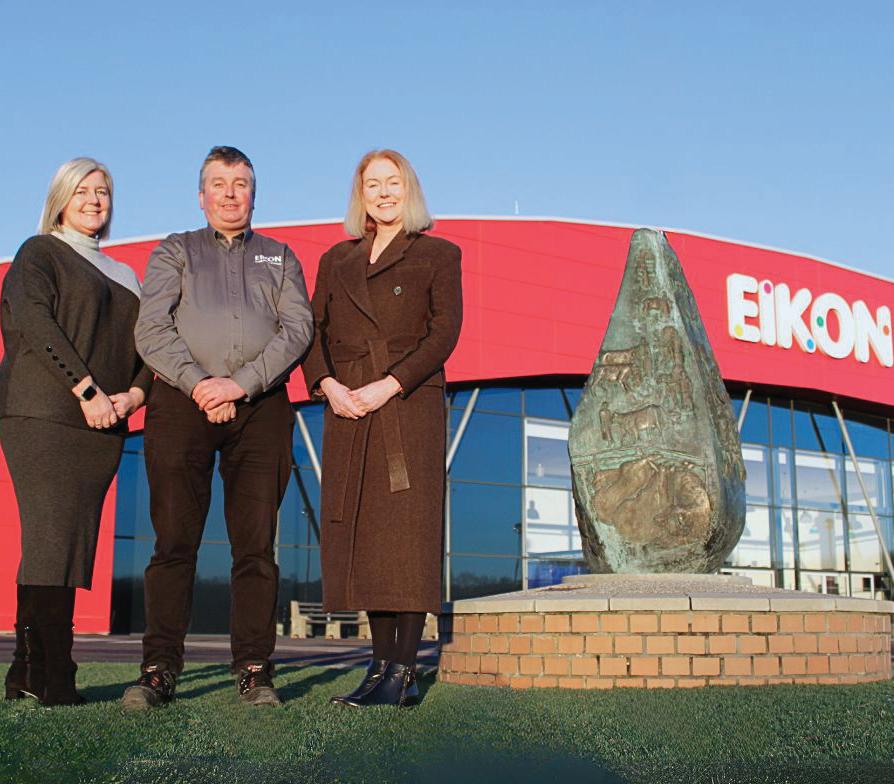
was instrumental in steering us through every challenge. It’s incredibly rewarding to see how the venue has grown over the years.”
For Rhonda Geary, Group Operations Director and the driving force behind key agricultural events such as the Balmoral Show, Royal Ulster Winter Fair, and Royal Ulster Premier Beef & Lamb Championships, the priority was ensuring the new venue could meet the diverse needs of both agricultural and
non-agricultural clients. Reflecting on the journey, she shared:
“Our goal was to create a space that not only embraced modernity and versatility but also upheld the rich traditions of the agricultural community we represent. Hosting events like the Balmoral Show alongside diverse gatherings such as Dubshed and the National Balmoral Championships has truly highlighted the adaptability and potential of the Eikon
Exhibition Centre.”
The 10th anniversary of the Eikon is not just a celebration of its achievements but also a tribute to the visionaries who brought it to life and the countless individuals who have contributed to its success. From its agricultural roots with the RUAS to its status as a premier event destination, Eikon’s story is one of growth, innovation, and an unwavering commitment to excellence.


As the slurry closed season comes to an end, NI Water are reminding farmers to ensure that they protect water resources when spreading slurry or manures this springtime.
We ask everyone to consider carefully before spreading slurry, or other organic manures,
so that there is no risk of pollution to our watercourses. This is particularly important
this year in light of the algae issues we have seen in many of our lakes in the past year.

During February organic manures (including dirty water) must not be applied:
• Within 250m of a borehole used for public water supply
• Within 50m of a borehole, spring or well
• Within 30m of lakes
• Within 15m of a waterway other than lakes (reduced to 5m when using LESSE)
• On waterlogged soils, flooded land or land likely to flood
• On frozen ground or snow-covered ground
• If heavy rain is forecast in the next 48 hours
• On steep slopes (with an average incline of 20% or more on grassland, 15% or more on all other land)
Roy Taylor, NI Water Catchment Manager, said: “Care in timing
and placement of slurry, manure and fertiliser is essential to minimise the potential for loss from land to water. Steep slopes and soils with impeded drainage are vulnerable to runoff and losses during rainfall events. A rainfall event lasting only a few hours can deliver a large proportion of the total annual loading of phosphorus to rivers and lakes.
“If slurry is spread on poor, very wet ground or during or just before wet weather conditions, it can run off the land; this results in valuable nutrients ending up in our watercourses. Removing this from our water is difficult and expensive to treat, in order to provide the high-quality drinking water we all expect.”
How you can help to
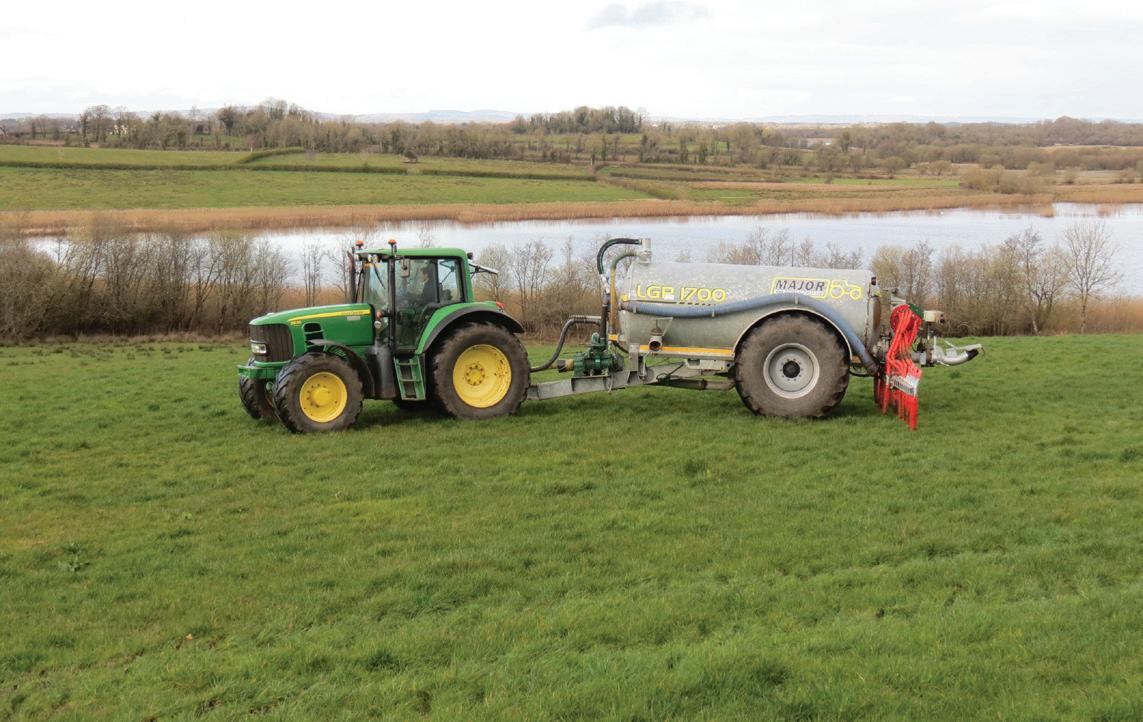
improve Water Quality:
• Only spread slurry and fertilisers when conditions are suitable
• Use the DAERA online tools to calculate your farm’s Phosphorus balance and manure
Nitrogen loading
• Check your farmyard for slurry run off and
sources of pollution
• Prevent cattle access to rivers causing erosion, sediment loss and pollution
• Nutrient Management Planning – if available use your Soil Nutrient Health Scheme results and run off risk maps
• Minimise Phosphorus
inputs – meet P crop requirements from manures. Each tonne of concentrate feed contains approx. 5 kg of P
• Eliminate chemical P fertiliser. Save money and help the environment
Follow the Nutrients Action Programme to farm efficiently
The cottage garden, with its informal and romantic character, evokes a sense of peace and tranquility. It’s a style that embraces the natural world, celebrating a riot of colours, textures, and scents.
To design your own enchanting cottage garden, embrace the natural by avoiding perfectly manicured lawns and straight lines. Opt for curving paths, irregular borders, and flowing planting areas. Let your borders blend into the surrounding landscape, allowing plantings to spill over paths and create a sense of informality.
Utilise natural materials like stone, brick, and wood for paths, edging, and

garden features. Fill your garden with a profusion of flowers in a variety of colours and heights. Think cottage classics like roses, peonies, delphiniums, and poppies. Include annuals like nasturtiums, petunias, and sunflowers to add bursts of vibrant colour throughout the season. Intersperse herbs and vegetables amongst the flowers for a truly productive and picturesque garden.
Create a sense of depth
by planting a mix of tall, medium, and low-growing plants to create layers and visual interest. Utilize climbing roses, clematis, and honeysuckle to adorn fences, walls, and arches. Plant low-growing groundcovers like ivy or sweet woodruff beneath taller plants to add texture and suppress weeds.
Incorporate unique features such as a small pond, a bubbling fountain, or even a simple birdbath to add a touch of magic


to your cottage garden. Create shady seating areas and support climbing plants with charming arches and pergolas. Add rustic touches with antique garden tools, birdhouses, and decorative pots. Finally, embrace imperfection. Allow some weeds to flourish, and let nature take its course. Regularly deadhead spent blooms to encourage continuous flowering and prevent self-seeding. Most importantly, enjoy the process. The cottage garden is all about enjoying the journey. Relax, observe your plants, and let your garden evolve over time.
By following these tips, you can create a charming cottage garden that is both beautiful and inviting. Remember to let your personality shine through and enjoy the process of creating your own unique piece of horticultural heaven.

Rebekah Evans was presented with the Young Farmer of the Year award by Isuzu UK dealer, Eakin Bros, at the Northern Ireland (NI) Farming Awards 2024. The event, taking place at the Crowne Plaza Belfast, recognised farmers achievements across the country.
Rebekah Evans was acknowledged for her unwavering commitment to the agricultural industry. Evans takes on multiple part-time roles, including working on a dairy farm and at a local agricultural supplies store, whilst simultaneously studying for her A Levels.
The nomination for Evans outlined her ambition to going above and beyond to learn and develop into an exceptional farmer, stating: “We could immediately see an admirable work ethic and ability to pick up information and tasks instantly for such a young age, she literally could ‘turn her hand
to anything’. She is so eager and willing to learn every aspect of farming and has gained a wealth of qualifications, achievements and experience within the farming industry for someone so young.
Evans lives on the family farm with her parents, two sisters, and grandmother. She has been regarded as particularly hands on at the farm, which works with 50+ dairy cows, and 60 commercial breeding ewes.
Some of her day-today responsibilities include feeding calves twice a day, managing the breeding plan for the herd, and she also artificially inseminates

the cows when they are on heat.
The award winner’s drive and passion for farming has been recognised with an
impressive award win at the NI Farming Awards.
For more information about Eakin Bros, please visit www.eakinbrosltd. co.uk.
The cold spell in the past weeks has acted as a reminder that now is a good time to plan for all eventualities in weather conditions.
Kieran McCartan, College of Agriculture, Food and Rural Enterprise (CAFRE), Agri-environment Adviser, reminds us that: “Freezing conditions may result in frozen and burst pipes; snow and ice can result in problems in getting deliveries in or collections out and feeding stock outdoors. High wind has the potential for causing damage to farm buildings.” For each of these risks you should think about how you would deal with severe weather and your ability to provide water, food and shelter for livestock.
Kieran advises that: “It is good practice to ensure all water pipes within and outside buildings are well insulated. Turn off water to fields that have no livestock and keep a supply of relevant water fittings to repair any leakages that appear after the thaw. Check antifreeze is in all vehicles. You should also keep a supply of grit / salt.”
Kieran continues that “If wind is forecast, secure all
loose objects that may be blown around the farmyard, close and secure all doors and windows. Keep away from the sheltered side of walls, buildings and trees in case they collapse. Do not go and repair damage while the storm is in progress. Do not drive unless your journey is necessary and if you must drive, be aware of side winds. Do not touch any electrical /telephone cables that have blown down.”
If snow and frost are forecast, plan how you would get food and water to your livestock. If milk collections are suspended, have you extra storage capacity in place?
If feed deliveries can’t get through, have you sufficient feed stored to cover your requirements. Minimise air flow by sealing doors and preventing drafts, drain out the milking machine and protect pipes/pumps from freezing.
Keep tractors, handlers and quads in a shed when not in use. Check and test backup generators and
equipment, never use stand by generators indoors, as the fumes from the engine can be lethal.
Before going out onto the land always tell someone where you are going, how long you will be and wear suitable layers of cloths and high visibility clothing when searching for animals.
Kieran advises to: “Keep a close eye on the weather forecast so that you can take appropriate action. Check websites to see if there is interruption to water and electricity supplies in your area. Some time spent now, preparing your farm for the unexpected, could save you a lot of problems in the future.”
Have a list and/or store the numbers on the phone of those you may need to contact. These could include the electricity company, electrician, NI water, plumber, milk collection and meal supplier and keep your phone and a torch fully charged. The main priority is that you stay safe.




Ulster Bank announced as principal sponsor of 2025 Balmoral Show
Ulster Bank and the Royal Ulster Agriculture Society (RUAS) have kickstarted the countdown to the 156th Balmoral Show.
With four months to go until the 2025 event, representatives from both organisations met to announce some new attractions for this year’s event and to confirm Ulster Bank will remain as principal sponsor of the show – marking a sixteenyear partnership between the two organisations.
Returning to Balmoral Park from 14-17 May, this year’s Balmoral Show in partnership with Ulster Bank will once again feature a kids’ farm, a mini–Land Rover experience, the return of the Sustainability Village, along with the usual mix of machinery displays, food exhibitions and funfair attractions.
Some new livestock classes have been added to the 2025 programme including a Breeding Heifer class which will recognise excellence in the beef industry and additional qualifiers for the Performing Irish Draught, Connemara Ridden and Working Hunter horse classes, due to their growing popularity and high standard of competitors.
Show organisers are keen to consider the needs of all visitors this year and have introduced a designated wellbeing area for those

with additional need and enhanced the sensory space for younger showgoers.
Group Operations Director at the Royal Ulster Agricultural Society, Rhonda Geary, said it is important to RUAS that everyone attending the 2025 Balmoral Show has an enjoyable experience.
“The Balmoral Show in partnership with Ulster Bank attracts over one hundred thousand visitors across the four days and as show organisers, it’s our responsibility to ensure that everyone can access and enjoy the event. We have been working with our partners to introduce a new children’s sensory area and an enhanced wellbeing area for anyone wishing to find a quiet spot at the Show following a successful pilot in 2024.
“As an agricultural show, food and farming has always
be the core of our activity, and this year will be no different. Thanks to the support from our principal partners at Ulster Bank, we have been able to add more exciting attractions to the programme and we are confident that this year’s Show will be a fantastic showcase of agriculture in Northern Ireland.
Cormac McKervey, Senior Agriculture Manager, Ulster Bank said he was looking forward to working with the RUAS once again to deliver this year’s Balmoral Show.
“2025 marks the sixteenth year of Ulster Bank’s title sponsorship of the Balmoral Show, and we are proud of the role we have played in the show’s development.
“Ulster Bank’s support for this sector extends well beyond the Balmoral Show and year-round, we support farming businesses and have
a range of solutions available to meet their financial needs.
“Balmoral is always a great opportunity to meet with and learn from others across the supply chain and our teams of Relationship Managers will be on the ground throughout the show to engage with farmers about the future of farming and how we can better support the local industry here.”
Early bird tickets for this year’s event are already available to purchase online and the details of livestock competition entries, show opening hours, and the full programme of events will be available on the Balmoral Show website in the coming weeks.
For more information about how Ulster Bank can support your business needs, visit www.ulsterbank.co.uk/ business



The cold weather may have you dreaming of warmer days ahead, and now is the perfect time to start planning for the spring season. The warmer months are just around the corner, and it’s a great opportunity to tackle home improvement projects that will refresh your space, boost functionality.
Revitalise Your Lawn and Garden
Spring is the ideal time to give your yard the attention it deserves. After months of Cold weather, your lawn and garden will need a little TLC to ensure they’re vibrant and healthy when the warmer
both functional and inviting. Whether you’re hosting a BBQ with friends or relaxing with a good book, the right patio setup can create a cosy, stylish retreat.
• Patio Sets:
• Outdoor Pillows: Add a pop of colour and comfort to your

weather arrives.
Once your lawn and garden are refreshed, it’s time to turn your attention to your outdoor living spaces.
Patio furniture is essential for making your outdoor space

comfortable with outdoor heaters or firepits.
Create the Perfect Outdoor Entertaining
Space
outdoor space with vibrant throws and pillows.
• Outdoor Heating: While the days may be getting warmer, here in Northern Ireland it can still be a bit chilly. Keep your outdoor space
Spring is the perfect time to start thinking about outdoor gatherings with friends and family. Whether it’s a BBQ, hosting a small party, or enjoying a quiet evening by the outdoor fire, creating a cosy and functional space will elevate your outdoor entertaining.
Products for Outdoor Fun:
• BBQs: There is such a choice now from gas, charcoal, electric and smokers,
perfect for grilling up delicious meals on your Patio.
• Fire Pits: As evenings cool off, a fire pit is a must-have to keep you and your guests warm while enjoying the outdoors.
• Outdoor Lighting: Make sure your
outdoor space is inviting, even after the sun sets, with stylish outdoor lighting.
• Relax and Recharge with a Hot Tub
After a long winter, there is nothing better than unwinding in a hot tub on a cool spring evening. Hot tubs will transform
your backyard into a personal oasis of relaxation. Don’t forget the essentials, like covers, steps, and maintenance kits. Don’t wait for the season to catch you off guard—get your home prepped for a fun, relaxing, and beautiful season!


Agriculture, Environment and Rural Affairs Minister Andrew Muir has visited Drum Manor Forest Park, which suffered significant damage following Storms Darragh, Eowyn and Herminia, to see the clean up efforts.
Drum Manor Forest Park is one of many forests and country parks that were severely impacted by the storm and has resulted in greatly reduced access due to public safety issues.
Minister Muir met with Forest Service staff and contractors, who have worked diligently to assess the extent of damage and are carrying out priority clearance works, in particular, those affecting residential properties and neighbouring businesses. This includes restoring access to public facilities such as toilets.
Speaking of his visit, Minister Muir said: “It’s truly shocking to see the damage inflicted to our local forests and country parks by the recent storms. Many of our oldest and most precious trees, some over 100 years old have been lost. Some of the worst hit forests are Drum Manor, Gosford, Tardree, Tollymore, Castlewellan, Riversdale, Lough Navar, Favour Royal, Fardross, Mullaghafad and Kesh.
“Many forests have greatly reduced public access for public safety reasons and several
facilities remain unavailable. Further assessment and works to reinstate access has commenced across the forest estate and is expected to be ongoing for a number of weeks in many forests. The public should check on NIDirect or local council websites, to see when the forests and country parks are accessible to visit again and respect all public safety signage.
“While our country parks are now mostly open to the public, works to fully restore public access to all areas are ongoing. Electricity supply issues remain and the Forest Service staff and contractors are working closely with NIE to restore power in many rural locations.
“I would like to express my deep gratitude to the many Forest Service and Country Park staff, and the specialist contractors, who have been working tirelessly to make our estate safe again. They have also assisted with the cleanup efforts of roads, residential properties and neighbouring businesses and in the reconnection of the electricity supply.”

In a world of mass-produced, disposable goods, antique and vintage furniture offer a refreshing alternative.
These pieces, with their rich history and unique character, bring a sense of warmth, authenticity, and sustainability to any home. But their appeal goes beyond mere aesthetics. Let’s delve into the numerous benefits of incorporating these timeless treasures into your living space.
Unlike much of today’s mass-produced furniture, antique and vintage pieces were often handcrafted with meticulous attention to detail. They were built to last, using high-quality materials and time-honoured techniques. This translates to exceptional durability and longevity, ensuring your investment will stand the test of time.
In a world where everyone seems to have the same furniture from big-box stores, antique and vintage pieces offer a chance to express your individuality. Each piece has its own story and history, making it a unique addition to your home. You’re unlikely to find the exact same piece anywhere else, adding a touch of exclusivity to your décor.

Choosing antique and vintage furniture is a sustainable choice that benefits the environment.
By repurposing existing pieces, you’re reducing the demand for new production, which in turn conserves resources and reduces waste. It’s a conscious way to furnish your home while minimizing your environmental footprint.
Antique and vintage furniture encompasses a wide range of styles, from classic to mid-century modern, ensuring there’s
something to suit every taste. These pieces have a timeless quality that transcends fleeting trends, adding a touch of elegance and sophistication to any space. They can be seamlessly integrated into various décor styles, from traditional to contemporary, creating a unique and eclectic look.
Antique and vintage furniture carries with it a sense of history and heritage. Each piece has a story to tell, connecting you to the past and adding depth

and character to your home. Owning a piece of history can be a truly enriching experience, sparking conversations and adding a unique dimension to your living space. While not the primary reason to buy antique and vintage furniture, some pieces can appreciate in value over time. As they become rarer and more sought-after, their value can increase, making them a potentially sound investment. However, it’s essential to do your

research and consult with experts before making any investment decisions.
Contrary to popular belief, antique and vintage furniture can be quite affordable, especially if you’re willing to hunt for it.
Flea markets, antique shops, and online marketplaces offer a treasure trove of unique finds at reasonable prices. With a little patience and perseverance, you can furnish your home with beautiful, high-quality pieces without breaking the bank.





“Heifer rearing on a dairy farm is often seen as a high-cost enterprise with little return,” says Alan Hopps, Senior Dairying Development Adviser with the College of Agriculture, Food and Rural Enterprise (CAFRE).
However, Alan emphasises: “If heifer rearing is prioritised, heifers can calve at a younger age, produce more milk in their first lactation, and remain productive on the farm for longer. This not only reduces the need for land due to fewer heifers present on the farm, but it also lowers the carbon footprint and enhances overall farm profitability.”
Alan outlines several measures of successful heifer rearing.
Calving Age: Heifers should calve at 2224 months. Calving too early can lead to ‘calving pattern creep’ causing heifers to calve outside the herd’s calving window if not managed properly. For all-year-round calving herds, calving at 21 or 22 months is not an issue if heifers are well grown.
Retention Rate: Aim for 90% of heifers to calve again in the herd for a second lactation. Heifers leaving the farm during their first lactation won’t cover their rearing costs.
Milk yield: Heifer yield should exceed 80% of mature cow yield. For instance, if the herd averages 8,500 litres, heifers should produce over 6,800 litres, maintaining an average herd yield of 8,000 litres overall.
Weight at Service:
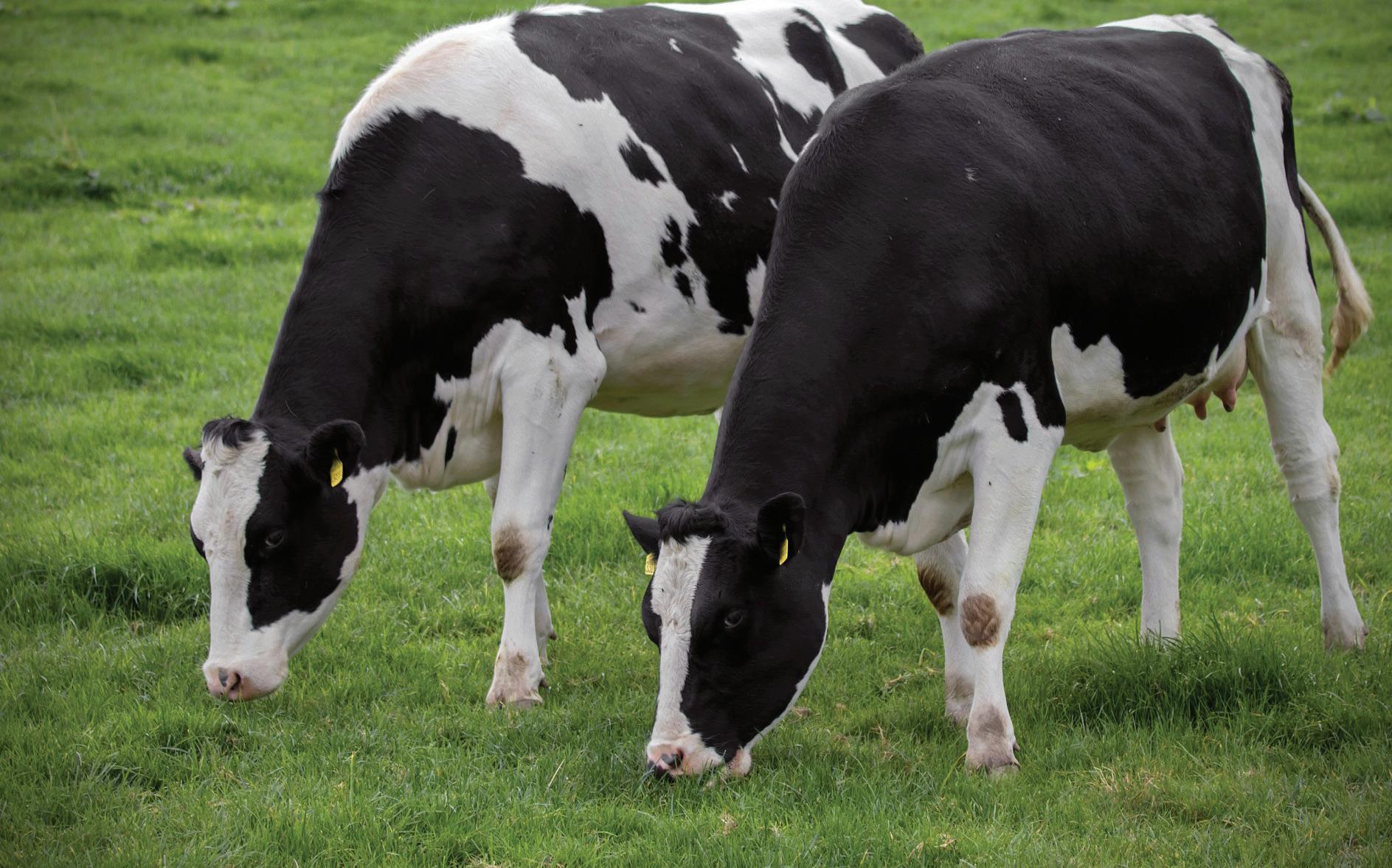
Heifers should reach 55% of their mature weight by service. For a herd averaging 650kg, heifers should weigh around 360kg at breeding, which can start at 13 months if they meet the target weight.
Weight at Calving: Heifers should calve in at 85% of their mature weight. Thus, for a herd of 650kg, heifers should weigh at least 550kg at calving.
Alan also highlights crucial factors for a successful heifer rearing enterprise. Starting with careful sire selection. Always choose sires with a higher potential transmitting ability (PTA) for milk than
the herd’s average to ensure progress in improving the milk yield potential of the herd. Remember, a herd with a PTA of zero on average still has the potential for a herd yield of 9,000 litres. Other elements of a bull’s figures which are important to consider are PLI, lifespan, fertility index and components. Functional type should also be considered to help ensure a longer herd life.
The rearing phase is very important. The first meal a heifer calf gets, 4 litres of colostrum, is the most important of its lifetime and vital for its future. Following


this, a milk feeding regime should ensure optimal growth, with peak calf milk replacer feed rates exceeding 1kg per calf per day or 8 litres of whole milk.
Reducing diseases such as scours and pneumonia during the rearing period is essential. Work with your vet to create a vaccination program and ensure hygienic, airy housing to promote growth.
Aim for an average growth rate of 0.8kg/ day from birth to calving, maintaining consistent growth throughout the heifer’s life if possible.
“If you don’t measure something, you can’t manage it,” suggests Alan. “An interactive program on the online services section of the DAERA website, under the BOVIS heading, allows you to track heifer performance against your targets. You can enter weights against
individual heifers that automatically populate from NIFAIS. Weights can be from a heifer weigh band measurement or an actual weighing. A graph of heifer weights against their target is automatically produced. If heifers lag behind target, nutritional adjustments can be made to help them catch up.”
Alan concludes:
“Some of the best heifer-rearing farms in County Armagh are achieving average firstlactation milk yields of 10,000 litres, with an average lifetime yield of 45,000 litres. These heifers have a weight at calving of 650kg and a conception rate in their first lactation of 54%. While not all farms will target such high yields, this demonstrates the potential achievable with excellent genetics and careful management of your heifer enterprise.”

2025 is set to be a busy year for agricultural enthusiasts in Northern Ireland, with a packed calendar of shows and events showcasing the best of farming, food, and rural life.
Whether you’re a seasoned farmer, a foodie, or simply looking for a fun day out with the family, there’s something for everyone. Here’s a glimpse of what’s in store:
Balmoral Show
2025: Kicking off the season in style is the Balmoral Show, Northern Ireland’s largest agri-food event. Taking place from Wednesday 14th to Saturday 17th May at the Eikon Exhibition Centre in Lisburn, this year’s show promises to be bigger and better than ever. Expect to see prize-winning livestock, cuttingedge agricultural technology, delicious local food, and a variety of entertainment for all ages.
Following the Balmoral Show, a number of smaller agricultural shows will take place across Northern Ireland throughout the summer months. These events offer a chance to experience the unique charm of local farming communities and
witness the passion and dedication of local producers. Some of the shows to look out for include:
Ballymena Show:
Held on Saturday 31st May, this show is known for its friendly atmosphere and strong focus on livestock competitions.
Ballymoney Show: Taking place on Friday 6th and Saturday 7th June, this event features a wide range of attractions, from show jumping to craft stalls.
Castlewellan Show: Castlewellan Show runs Saturday 19 July 2025, from 9am-6pm and offers a fantastic, fun day out for all the family, with something for everyone. It is a one-day celebration of local farming, food and rural life. On the day there will be a variety of livestock classes, with thousands of animals being judged. Attractions include the ever-popular showjumping, impressive dog agility, pony games and a family pet show. With children’s
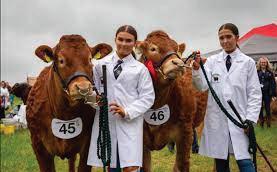

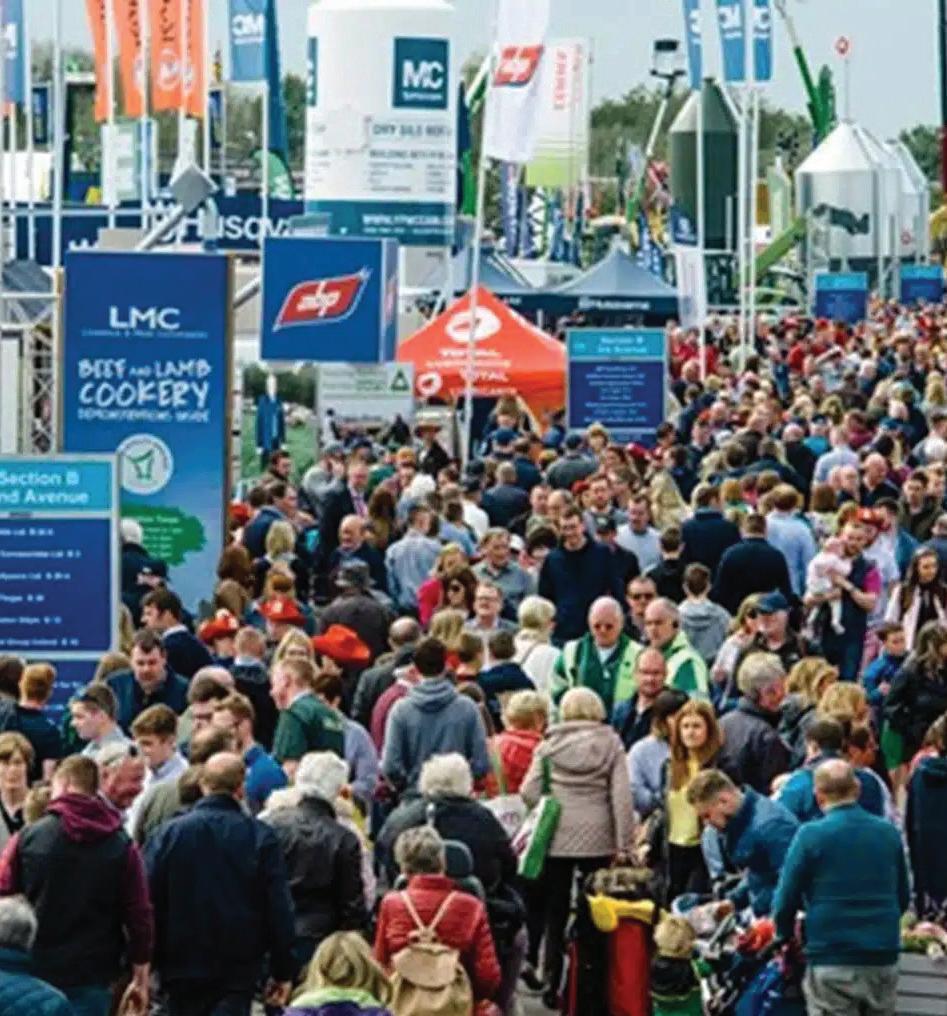
entertainment, a great variety of trade stands, Crafts & Home Industries marquee, Food Village and Eco Village - Castlewellan Show offers a fantastic local day out for all the family.
Lurgan Show: Held on Saturday 7th June, this show is a great opportunity to sample local produce and learn about the region’s rich agricultural heritage.
Newry Show: Taking place on Saturday, June 28th, this show is a celebration of the farming and food industries throughout the Newry region.
Omagh Show:
Tyrone Farming Society now look forward to the 183rd Annual Omagh Show which will take place on Friday 4 and Saturday 5 July 2025. Records indicate that it was first established in 1832, in an effort to encourage and sustain local agriculture.
Omagh Show’s enduring success can perhaps best be described as a true reflection of determination and
motivation of its supporters throughout the years. Now ideally located on a purpose built facility on the outskirts of Omagh town, this thriving Annual Show remains a source of much pride for its community.
Saintfield Show: The Date for your diary this year is Saturday 21st June 2025. Last years very successful show took place at Glenbrook Farm home to the Lawson family. Saintfield Show is now in its 81st year and has a great history of showcasing all things agricultural to the local Co. Down community A year to celebrate Northern Ireland’s agricultural heritage 2025 promises to be a year of celebration for Northern Ireland’s agricultural sector. With a diverse range of shows and events taking place, there’s something for everyone to enjoy. So mark your calendars and get ready to experience the best of farming, food, and rural life in Northern Ireland!

Our guide to rated holiday hotspots, hotels and eateries you won’t want to miss!
With rolling hills, dramatic coastlines, cosmopolitan cities and charming villages little wonder that Ireland and NI are so popular with tourists! With so many places to choose from, it can be hard to know where to stay! Luckily we’ve put together a guide which may help! No matter what your budget or travel style, you’re sure to find the perfect place to stay.
If you’re looking for a hassle-free way to see the best of Ireland, consider booking a tour with Gleneagle Coach Tours. With stays and meals based at the Gleneagle Hotel - they offer a variety of itineraries visiting Killarney and further afield such as Kerry highlights and specialist interest tours taking in dancing events or music festivals!
One of the most popular area destinations in Ireland is Donegal. This county is home to some of the most stunning scenery. The Abbey Hotel is a 4-star hotel located in the bustling Donegal town. Their music weekends are especially legendary and packed full with appears from Country royalty such as Jimmy Buckley and Adrian Ryan!
Another great option for accommodation in Donegal is Mulroy Woods Hotel. Located along the Wild Atlantic Way, at Milford, this is a modern and stylish 4-star hotel which is the perfect base for exploring the rugged beauty of the surrounding area. See their Stay, Dine & explore offer on their colour advert in this issue!
The Causeway Hotel is located on the North Antrim Coast, only a short distance from the Giant’s Causeway. This lovely hotel is currently having a March madness sale with exclusive offers including free entrance to the Giant’s Causeway Visitor experience, stay longer save more, complimentary prosecco, late check out time, kids stay and eat free and more!
Chestnutt Holiday Parks have four Top 100

rated sites along the Mourne Coast. Open for Van Hire, Camping, Tourer pitch or Van sales - whatever your choice you are encouraged to Create memories with Chestnutt Holiday Parks today!
The Four Seasons Hotel, Carlingford is luxurious spot with spa and a spectacular wedding venue! It has recently undergone a number of renovations including the fabulous new executive bedrooms and classically decorated Lobby with a modern twist, featuring sphere hanging chandeliers and chic button tufted couches.
Why not invest in a the surety of endless fun family breaks every year by buying your own beach front holiday home with Milne Holiday Parks. Milne Holiday Parks offer a fabulous range of new and used vans across a choice of six beach front locations including Cranfield Bay, Kilkeel and Newcastle!
The Marine Court Hotel, Ballycastle is an AA Four Star Hotel at the heart of the world-famous Causeway Coast & Glens, right by the sea! Currently offering Spring by the Beach breaks from £65pps
The Pheasant, Annahilt is the last word in gastro pub dining. If succulent steaks, marinated pork belly or crispy smoked honey chilli chicken is your thing – you’ll love their current Sharing Board offer!
Here are some more great tips for finding the best places to stay or dine:
• Book in advance, especially if you are travelling during peak season.
• Read reviews before you book.
• Consider your budget and travel style when choosing your venue – bearing in mind dress codes etc .
• Think about what you want to see and do while you are in the area and choose va place that is located close to the attractions that interest you.










The College of Agriculture, Food and Rural Enterprise (CAFRE) enjoys close connections with The Gibson Trust.
In recent years the Trust has shown an interest in further supporting Greenmount Campus students, by offering a substantial financial contribution to those studying on Agriculture programmes.
The Gibson Trust is a registered charity set up to celebrate the life of William Gibson. Mr Gibson was born in 1840 on a smallholding near Dromore, Co Down. After serving his time as a watchmaker, he set up his own business in Belfast, making watches and highquality silverware. Some years later, he started a second company in London. When he died in 1913, he bequeathed money to be invested to produce an income to help eligible farmers in Co. Antrim and Co. Down. For over 100 years, successive Trustees have managed the fund as directed in Mr Gibson’s bequest.
This year, The Gibson Trust will contribute to the cost of the annual study tours undertaken by final year students on the Level

3 Advanced Technical Extended Diploma in Agriculture programme. The educational tours will take place in May 2025, prior to these students completing their programme.
Sharon McLaren, acting Head of Agriculture Education at CAFRE said: “Study tours extend learning beyond the confines of a classroom. Visits to farm enterprises offer students a chance to engage with real-world experiences. We believe the study tours enhance our learners’ academic, personal, and professional growth. Organising the tours prior to course completion is a fitting occasion to mark, what is for some, the end of their educational journey before entering employment.”
Joe Mulholland, Senior Lecturer explained: “This year we have 68 final year Level 3 students who have expressed an interest in taking part in the programme. Our plan is to divide the students into three groups and accompanied by CAFRE staff members visit a range of farm enterprises. The tours will be made during the third week of May when assessments have been completed and will take to businesses in England, Scotland and Wales. The study tours will be a cornerstone of our experiential learning, something which is strongly encouraged within CAFRE. During the individual visits students will see for themselves theory applied to real industry applications, fostering better retention and application of the

knowledge they have developed during their course.”
For many of the students, the study tours will offer the opportunity to travel for the first time without the security of their family unit. They will be exposed to new cultures and perspectives, and through engaging in different routines and activities encouraged to build their confidence and independence.
During the visits students will be stimulated to interact with business owners, professionals, and peers in various fields.
Building these connections will enhance the students’ experience and offer them a glimpse into potential career paths along with the skills required for success.
“Study tours encourage students to engage with
group members, some of whom they have had little contact with over the past three years of their course,” commented Mr Mulholland. “It’s a great opportunity to create lasting memories and often we hear of lifelong friendships that have been forged thanks to the study tours. Sharing unique experiences strengthens bonds among students, creating a greater sense of community and belonging, something that we at CAFRE are proud of.”
“We are sincerely thankful to The Gibson Trust for offering financial support to CAFRE’s Further Education Agriculture students. The assistance will ensure as many students as possible can experience the study tours, without the pressure of self-funding the entire
costs. We believe the trips are an invaluable part of college education, and help our students prepare for life and work after CAFRE,” concluded Mrs McLaren. Further updates on The Gibson Trust Level 3 study tours will be shared in May and June. Keep a watch out in the press and on the CAFRE website to see where the students visited and hear about their experiences. If you are interested in studying for a qualification in Agriculture, or know someone who is, encourage them to attend the forthcoming Open Week at CAFRE. The Agriculture Courses Open Day is being held at Greenmount Campus on Friday 28 March. Book now to attend, visit the events section on: www.cafre. ac.uk
Northern Ireland’s largest nature conservation charity is asking County Down’s local wildlife supporters to make a difference for nature on their doorstep this year.
Ulster Wildlife is calling upon fans of our flora and fauna to make 2025 their ‘wildest year yet’ as it works to tackle the biodiversity crisis in Northern Ireland.
“We know nature here is in trouble, with 1 in 9 species facing the threat of extinction”, says Rosemary Mulholland, Head of Nature Recovery at Ulster Wildlife.
“The devastating images we see from Lough Neagh are the face of this crisis, and we need wildlife champions more than ever to help protect the nature they love.”
The local nature charity is leading on efforts to recover some of Northern
Ireland’s most beloved wildlife, including barn owls, red squirrels and hedgehogs, and is managing 18 nature reserves around the country – the equivalent of 1,190 football pitches – to create space for nature to bounce back.
“In recent years, we have seen the highest number of known barn-owl chicks fledged and recorded red squirrels and pine martens in more woodlands than ever before”, says Rosemary.
“Our reserves are vibrant and vital havens for nature, from rare butterflies and fungi to globally threatened seabirds like kittiwakes. They offer a

Ireland? You can support Ulster Wildlife for just £1.50 a month until Friday 31st January. Visit www. ulsterwildlife.org to join now.

